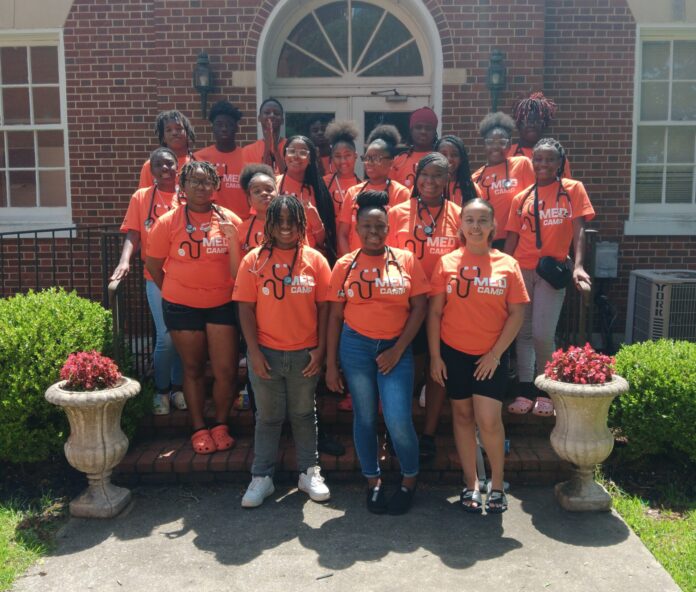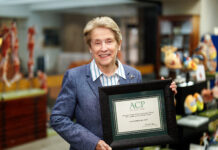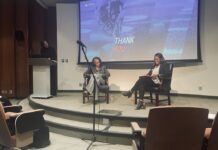Mercer University School of Medicine reached over 160 middle and high school students through three innovative medical camps over the summer.
The camps, which were made possible with support from the Ivan R. Chanin Fund of the Community Foundation of Central Georgia, were offered in-person in Randolph and Berrien counties. In addition, a virtual camp was accessible statewide.
The School of Medicine and Georgia Rural Health Innovation Center share a steadfast commitment to improving health care access in rural communities in Georgia. A cornerstone of this mission is the School of Medicine’s Pathways Program, designed to inspire and prepare the next generation of health care professionals. By engaging middle school, high school and undergraduate students, the program aims to cultivate a passion for medicine and a dedication to serving rural populations.
Be-Atrice Cunningham, director of the Pathways Program, underscored the program’s crucial role in addressing the rural health crisis.
“Our mission is to inspire students to pursue health care careers by providing them with hands-on experiences and mentorship,” she explained. “We aim to foster a strong connection with these students, guiding them through their academic journey and preparing them for successful careers in rural medicine. By cultivating a pipeline of qualified health care professionals, we hope to alleviate the shortage of medical service providers in rural Georgia.”
Randolph County Medical Camp at Andrew College
The Randolph County Medical Camp, now in its third year, offered 19 high school students an immersive week of health care exploration at Andrew College in Cuthbert from June 10-13. Led by Mercer School of Medicine faculty and medical students, participants gained hands-on experience in critical medical skills, including CPR, intubation and vital signs assessment.
Faculty from the medical school’s simulation labs led interactive workshops with practical applications, demonstrating life support skills using mannequins and a pig lung display to show the effects of vaping and smoking on respiratory health. Professor Ali Gheidi, Ph.D. introduced camp participants to neuroscience using models and virtual reality software to present brain anatomy and brain disorders.
“I was impressed with how engaged and inquisitive the students were,” said Dr. Gheidi. “They asked questions that have stumped neuroscientists. It was a great experience, and we’re looking forward to doing more rural outreach.”
From delving into neuroscience to understanding the complexities of mental health, the camp provided a comprehensive overview of various health care careers, including respiratory health, neuroscience, mental health, pharmacy and nursing.
Mentorship from local health professionals at New Horizons Behavioral Health, Adams Pharmacy, the Randolph-Clay County Health Department and the Southwest Georgia Area Health Education Center offered valuable insights into rural medicine, inspiring participants to consider future roles in the field. The program concluded with a celebratory graduation ceremony, recognizing the students’ accomplishments and fostering a passion for health care.
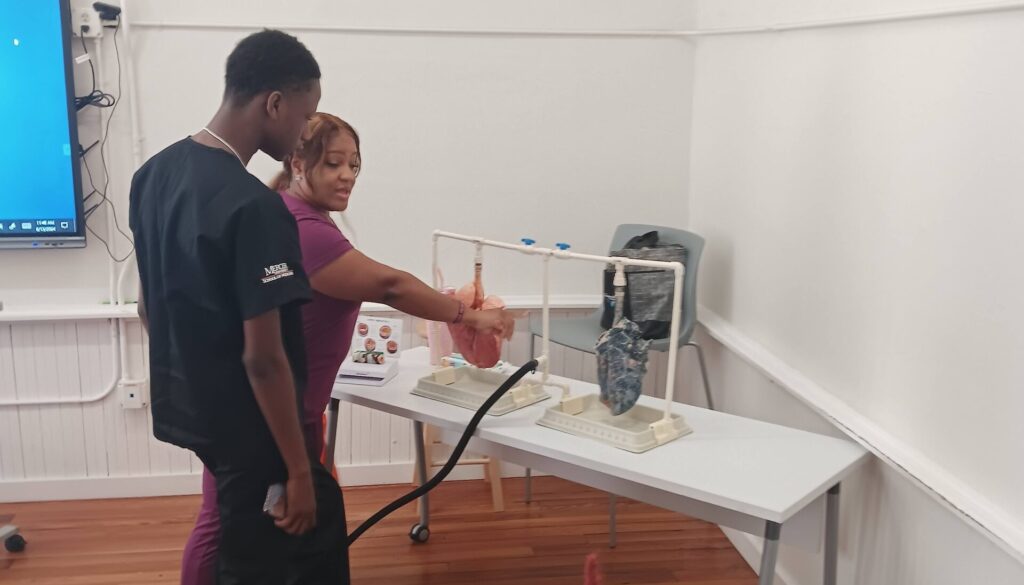
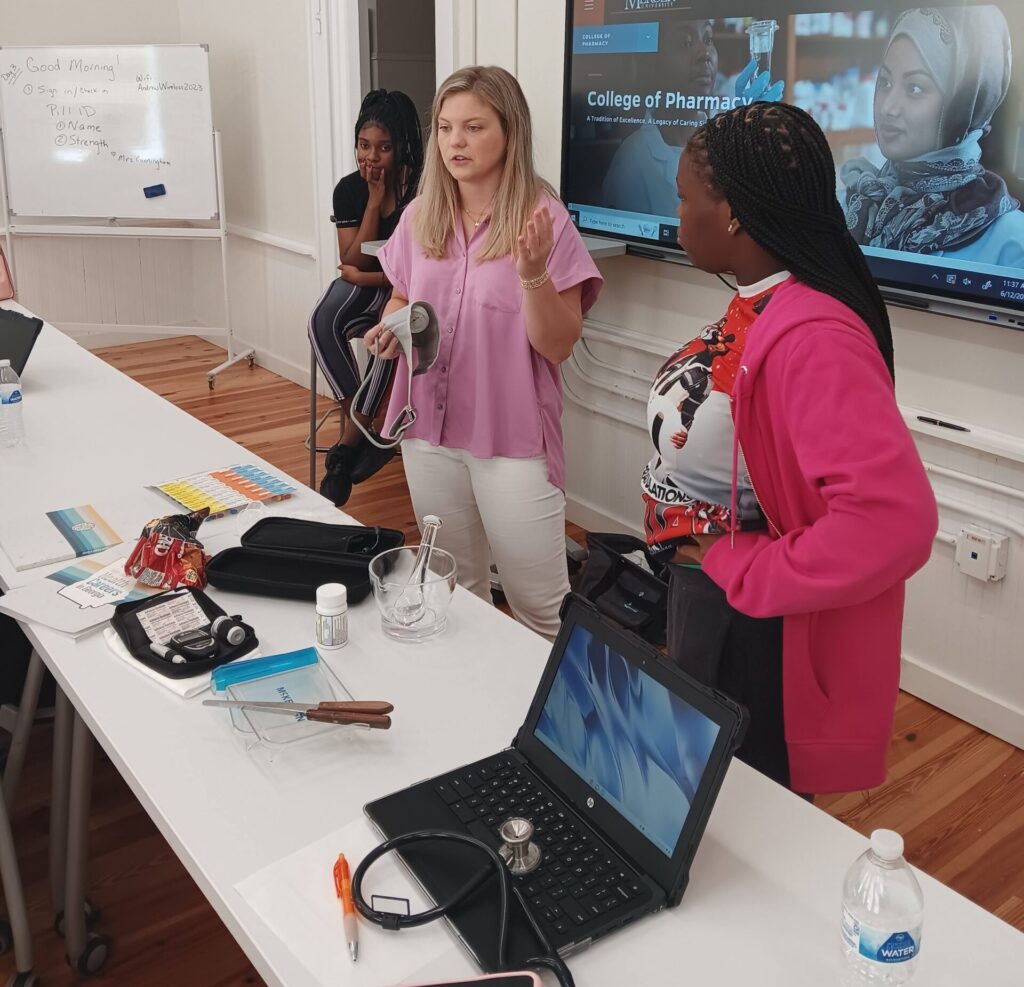
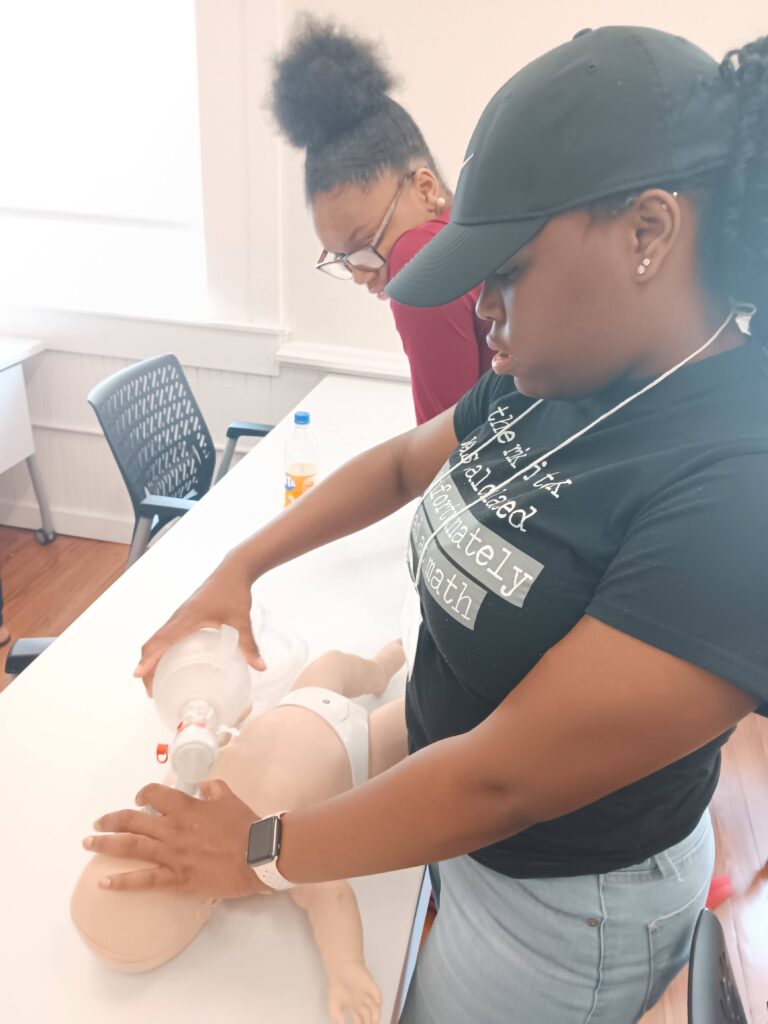
Berrien County Medical Camp and Community Health Fair
For the second year, the Berrien County Medical Camp in Nashville was a successful collaboration between Georgia Rural Health Innovation Center’s Faith in Rural Health initiative, Berrien County schools, Berrien 21st Century Community Learning Center, and several Mercer entities, including the School of Medicine, Georgia Rural Health Innovation Center, College of Health Professions’ physical therapy and physician assistant programs, and the Gateway Community Service Board.
Over the week, about 80 middle and high school students gained valuable hands-on experience from mastering CPR and exploring neuroscience to learning about physical therapy, suturing and sonography. Mental and emotional health were prioritized through sessions on bullying prevention and stress management. Georgia Rural Health Innovation Center’s senior rural health administrators, Joan Anderson and Travis Crafter, presented six wellness skills of Community Resiliency Model training designed to help children learn to track their own nervous systems to bring the body, mind and spirit back into greater balance.
“I was so impressed by how quickly the kids tapped into the meditation, deep breathing and guided imagery practice — as well as their willingness to openly share their place of calm and what mental health means to them,” said Mary Mercer, M.D., addiction medicine fellow at Gateway Community Service Board, who led a mindfulness workshop. “This type of mindfulness work would benefit every student and should be implemented in every school. I sure wish I had learned a few of these techniques growing up.”
Daily nutrition classes led by two Mercer medical students, Rena McKenzie and Anna Wiggins, taught campers how to prepare affordable, nutritious meals. Held in the high school home economics kitchen with fully equipped kitchen bays, campers enjoyed creating a different nutritious dish each day. At the end of the week, campers received a mini cookbook filled with recipes that included step-by-step instructions and estimated costs for a family of four, making healthy eating accessible and affordable.
The camp culminated in an awards ceremony and a community health fair, empowering young people and their families with essential health knowledge and skills.
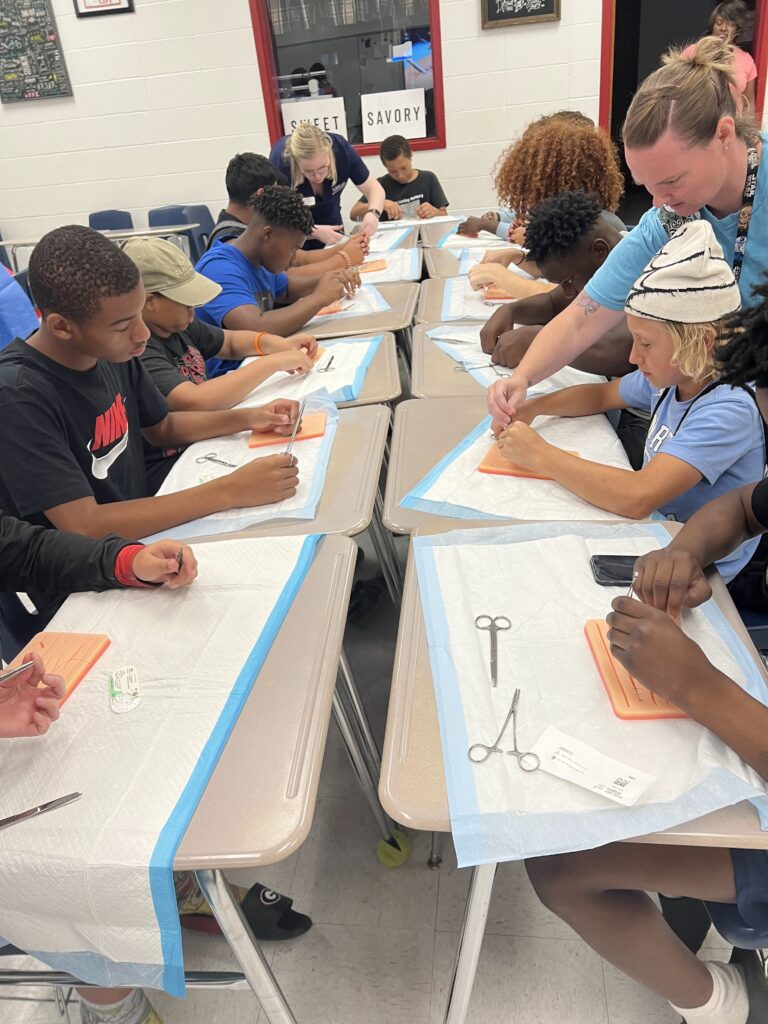
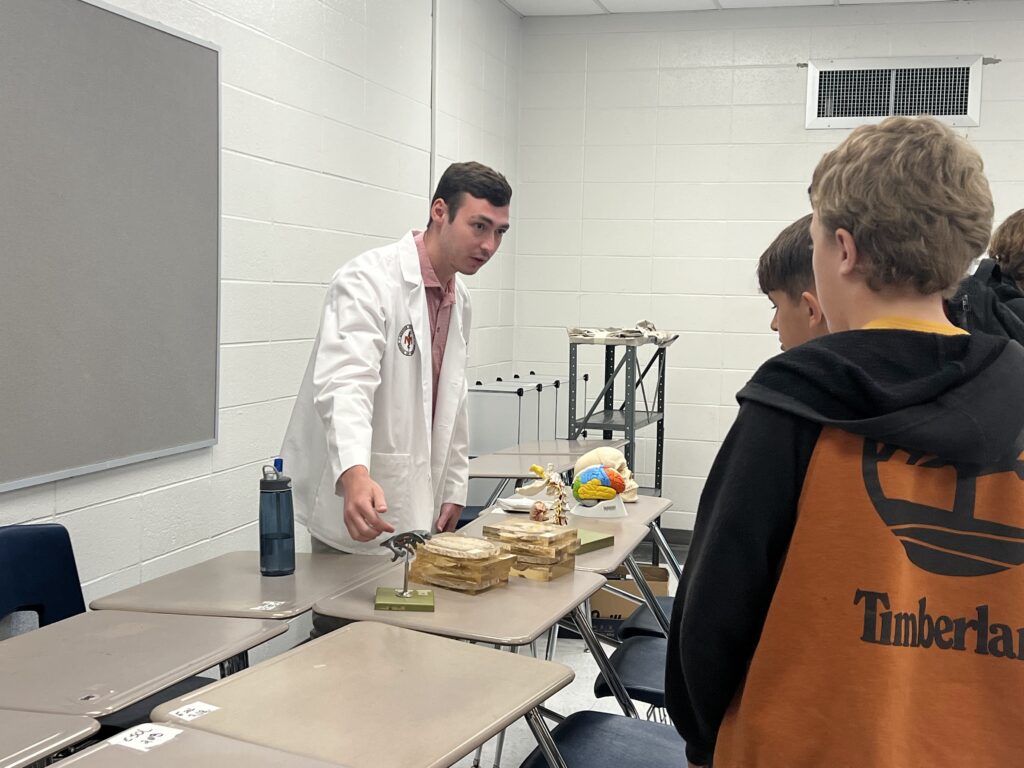
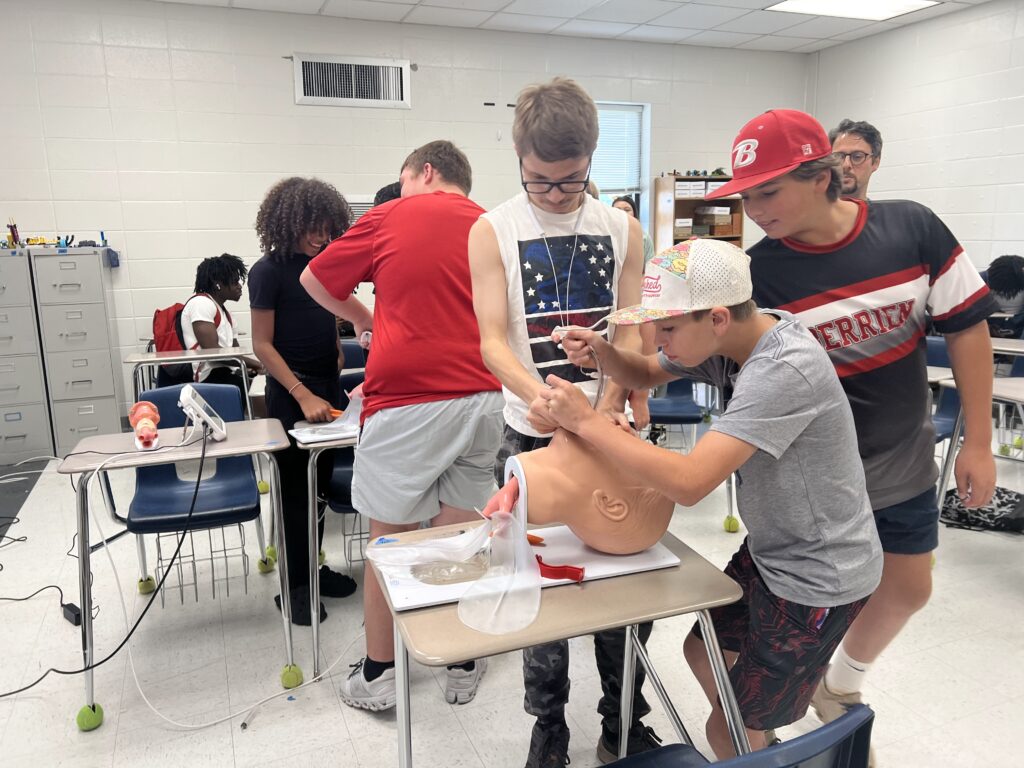
Virtual Medical Camp
The School of Medicine’s virtual medical camp offered a fun and informative “Back to the ’80s” experience for nearly 70 middle and high school students across Georgia. The two-hour daily Zoom sessions combined expert lectures from Mercer faculty with interactive activities guided by medical students. All activity supplies were shipped to participants free of charge, including games, experiments and a camp T-shirt.
Topics presented included mental health education, medical research, anatomy, respiratory health, taking vital signs and simple suturing techniques. Throughout the camp, interactive games and competitions led by “Dr. Rock” — otherwise known as Glenda Grant, executive director of the Georgia Rural Health Innovation Center — created a dynamic and memorable learning environment.
Early exposure to health care careers can profoundly influence a student’s path. Mercer School of Medicine Pathways provides invaluable opportunities for young people to explore various medical professions, develop essential skills, and become invested in their communities’ health.
“This work is an important part of our efforts to improve access to quality medical care in rural Georgia,” said School of Medicine Dean Jean Sumner, M.D., FACP. “This is a pathway both to a career in health sciences and an effective method of improving health literacy. I am extremely proud of our pathways initiatives.”
Mercer School of Medicine is dedicated to cultivating future health care leaders who are committed to rural communities. Through strategic partnerships and innovative programs, the School is training a new generation of medical professionals to address the health care disparities in Georgia.
To learn more about the Pathways Program, contact Cunningham at cunningham_b@mercer.edu.
About Mercer University School of Medicine (Macon, Savannah, Columbus and Valdosta)
Mercer University’s School of Medicine was established in 1982 to educate physicians and health professionals to meet the primary care and health care needs of rural and medically underserved areas of Georgia. Today, more than 60% of graduates currently practice in the state of Georgia, and of those, more than 80 percent are practicing in rural or medically underserved areas of Georgia. Mercer medical students benefit from a problem-based medical education program that provides early patient care experiences. Such an academic environment fosters the early development of clinical problem-solving and instills in each student an awareness of the place of the basic medical sciences in medical practice. The School opened additional four-year M.D. campuses in Savannah in 2008 and in Columbus in 2021, and a clinical campus in Valdosta in 2024. Following their second year, students participate in core clinical clerkships at the School’s primary teaching hospitals: Atrium Health Navicent The Medical Center and Piedmont Macon Medical Center in Macon; Memorial Health University Medical Center in Savannah; Piedmont Columbus Regional Hospital and St. Francis Hospital in Columbus; and SGMC Health in Valdosta. The School also offers master’s degrees in preclinical sciences and family therapy and Ph.Ds. in biomedical sciences and rural health sciences.

